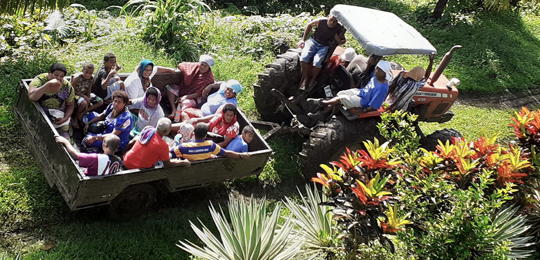November 2019
Tutu Rural Training Centre Continues To Thrive Where Many Have Failed

Students of Tutu Rural Training Centre (TRTC) occasionally play the role of tour guide on their farming progress for visiting parents which staff say has partly attributed to the success of TRTC
Young graduates of Fiji’s Tutu Rural Training Centre (TRTC) earn decent livelihoods.
TRTC’s Father Petero Aparama revealed the highest annual income by a former student of the Young Farmers Course (2018) stood at $120K FJD.
“The consistent and exceptionally high return rate to farming is what makes the centre a stand out in comparison to other farmer training programmes in Fiji and other Pacific islands.”
“Since 1983, 224 young men completed the Young Farmers Course,” he said.
“Of these, 92 per cent of them (206) are still farming as their source of livelihood, of which 89 per cent (200) are farming their own family land.”
In the 1970s the Navuso Agricultural School (Fiji) operated by the Methodist Church was regarded as the premier farming institution in the Pacific islands.
Former Principal, Agricultural Education Advisor to the Government of Fiji and Regional Advisor to the UNDP on Rural Training in the Pacific, Geoff Bamford said the best return rate to farming achieved by Navuso Student Farmer Scheme was close to 50 per cent.
“For its first 70 years, the primary aim of the Navuso Agricultural School was to provide young men with knowledge and skills needed for farming.”
“Its success in reaching this objective varied over time,” he said.
“It had considerable success in its early years but by the late 50s and early 60s, it was becoming apparent that very few (about 10 per cent) were returning to farming after completing their course.”
“So in 1961 the Student Farmer Scheme was established in an effort to increase the number returning to farm their land.”
“An evaluation of the Scheme in 1971 showed that more than 50 per cent were now doing this, while another 25 per cent were employed in agriculture or related fields,” he said.
Upon reassessment of the renamed Navuso Agriculture College in 2001 none of the graduates had returned to farming and where a similar situation prevails for the Ministry of Agriculture’s Fiji College of Agriculture
TRTC’s long standing Principal, Father McVerry says successful training in agriculture is the most difficult.
“It has been taught at schools and other institutions by churches and government, small scale and large scale throughout the Pacific this century.”
“Success has been very limited and the reasons many,” he said.
“The most innovative and intelligent youth tend to leave rural areas, the prices for tropical produce have been low, isolation can be boring, land tenure and certain social practices greatly constrain action and innovation.”
“The Pacific social systems were designed in such a way that the older generation effectively exploit the young, who have little alternative than to be submissive,” he said.
“Now, they can escape and they do.”
“Morever, the western-derived education system instils in young people certain aspirations that can only be realized in town.”
In 2005, there were 125 registered Vocational Training Centres of which 108 were operational in Papua New Guinea compared to Vanuatu in 2009 where 38 out of 49 Rural Training Centres were operational.
In his 2010 assessment, Bamford reported that rural training institutions have been unsuccessful because they do not meet the needs and aspirations of young people wishing to become farmers.
“Very few of the graduates go on to become successful farmers because an appropriate set of skills is found lacking in its training.”
“The right attitude to develop a farming business, unconstrained access to land for farming, capital for farm development that can also provide independent housing and follow up on graduation,” he said.
